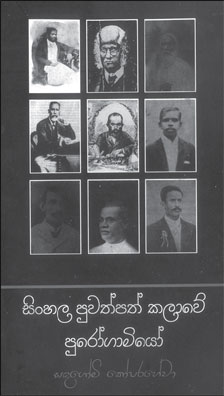Pioneers of Sinhala journalism
Sinhala Puvathpath
Kalawe Purogamiyo
Author: Sandagomi Coperahewa
A Godage publication
Reviewed by Padma Edirisinghe
It is an extremely wide corpus that the author has attempted to
pocket into a 250 plus paged text. The book encapsulates the literary
and academic careers of 18 pioneers of Sinhala journalism along with a
fitting focus on how each of them helped in the resuscitation of a
sinking academic and literary arena subsequent to three periods of
colonial rule.
 The Colebrooke Report issued in 1832 gives an explicit picture of
this degradation. Learning had fallen so low that very few were
literate. Pirivenas, the native educational institutes had deteriorated
so much so that they hardly earn mention in the report. The Colebrooke Report issued in 1832 gives an explicit picture of
this degradation. Learning had fallen so low that very few were
literate. Pirivenas, the native educational institutes had deteriorated
so much so that they hardly earn mention in the report.
And then the tide turned. A blossoming period erupted again. One of
the conundrums the reviewer had in a colonial-oriented educational set
up was, who was responsible for this stupendous turning of tides, when a
rich legacy of ancient Lanka rotated to its owner. It was a fascinating
drama, the chief actors of which the author of this book presents in all
their academic glory and incredible perseverance. The last factor
mattered much, for the group was up against a formidable task.
Off the track
To illustrate the point we may have to go off the track to the End of
the World episode that never happened. The only result was that it gave
a blaze of publicity to the Mesoamerican races. They fought a losing
battle against the Conquistadors who went on to destroy the indigenous
languages, literature and culture. Only in Paraguay in Latin America
that a news snippet in the original language has been preserved.
All others today use the lingua franca of the conqueror. The severe
bludgeoning covered not only their age old buildings but all aspects of
their culture.
Coperahewa in his well – researched book presents to us, 18 such
heroes who helped to turn the tide. Of course, the Maha Sangha was an
equally powerful force. But these newspaper people as we can call them
in mundane style, served equally. The author has performed a remarkable
feat sieving them out and pooling all the relevant details into a 250
page text that a researcher in a higher seat of learning, or a student
in a higher school Form or an ordinary reader may find equally
entrancing.
The eighteen journalists/ pioneers of the Sinhala newspaper world
thus covered are: Koggala Johannes Pandithathilaka, M. Dharmaratne, G.D.
Pelis Appuhamy, C. Don Bastina, Weragama Punchibandara, Thomas
Karunaratne, H.S. Perera, Piyadasa Sirisena, M.C.F. Perera, Munidasa
Kumaratunga, Alexander Weliwita, C.W. Wickremearachchi, Piyasena
Nissanka, Martin Wickremesinghe, Julius De Lanerolle, Hemapala Munidasa,
D.B. Dhananapala and David Karunaratne.
Renaissance
Can newspapers turn the tide and preserve an age old civilisation
from getting drawn into a hopeless abyss ridding a whole populace of its
soul? They did. First, they hung on to the already awakening renaissance
monitored by the Sangha and the patriots. And the rest, their newspapers
performed. The trials and tribulations these men underwent, the uphill
voyages that involved indescribable tedium, the myriad incidents and
adventures gone through are all here in lucid Sinhala replete with rare
photographs of the personnel dealt with.
Founts of knowledge
The book indeed fills the hunger for research–oriented works of this
nature by suitable writers who themselves are founts of knowledge,
keeping their minds always refreshed intellectually.
The time phase the “18 group” flourished and sets one thinking. A
good number of them have been born in the 19th century in the 1830s,
'40s and '50s that is a few years after the last king of Sri Lanka bid
adieu to her shores. Till the first phases of the 20th century they
tirelessly worked for the national rejuvenation, not only editing their
newspapers, but putting out a profusion of books, forming societies,
inciting the average populace to new ways of thinking, away from the
stalemate conditioning by colonialism and wrangling with the state when
not aiding.
When a free Lanka was born most of them had rehearsed their roles,
and set the stage. Writing is a powerful tool of immortalising such
icons and the author has done it remarkably.
He himself is a recognised writer and researcher. Senior lecturer at
the Sinhala Faculty of the Colombo University replete with all the due
qualifications, he has to his credit 15 other works, some co-authored.
He has a great future ahead in Lanka's intellectual firmament carrying
to posterity the torch of learning that resisted for 2500 years all
attempts to efface it.
|



